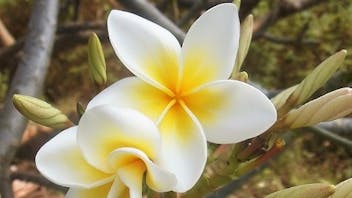Product Overview
Our amazing Jasmine CO2 has a very sweet, floral, slightly fruity and tea-like aroma, with a delicate, ethereal aroma and a hint of indole undertone. It is extracted from Jasmine concrète, rather than directly from the flowers. The concrète is produced during the first stage of creating Jasmine Absolute, then the oil from the concrète is extracted using modern CO2 technology. The result is a very viscous oil (nearly solid at cooler temperatures) with an aroma that is lighter, more delicate and more ethereal than Jasminum grandiflorum absolutes. Quite heavenly! However, since Jasmine CO2 is not completely liquid it is more challenging to work with, but we feel it is well worth it. Surprisingly, Jasmine CO2 is longer lasting on scent strips than the Jasmine Absolutes. It is a very lovely oil, highly concentrated, and recommended to all lovers of Jasmine.
Jasmine has been among the principal ingredients of more than 80% of all quality perfumes and a third of all men’s fragrances[1] The sensual aroma is exhilarating and playful, and according to Patricia Davis, brings together the fiery dynamism associated with the masculine aspect (yang) and the soft earthiness of the feminine (yin).[2] The uninhibited aroma evokes lightness and joy, setting the stage for physical awareness and imagination. It is no wonder that the flowers, thought to awaken the spiritual nature of intimacy, have been used traditionally in some cultures to decorate the bed of newlyweds. In magical spiritual traditions, Jasmine is used as a devotional anointing oil and is worn for blessings and good luck.[3]
One look at the chemistry of this seductive aroma explains a lot about its sensual appeal. Amid a bouquet of complex flowery esters, including methyl anthranilate, is the highly coveted indole, a molecule found naturally occurring in certain plants and also human pheromones. At very low concentrations, indole smells intensely alluring and floral. Appearing in some of the sweetest blossoms such as Gardenia, Orange Blossom, Champaca, Tuberose, Neroli, Narcissus, Jonquil, and Honeysuckle, perfumers use indolic aromas to bring enticing, hypnotic, or animalic qualities to compositions.
Jasmine vines in full flower have a voluptuous aroma that surrounds and embraces anyone who passes by. Indeed, no other floral aroma can compare to Jasmine’s legendary effects. The aroma of Jasmine is said to blend with virtually everything and is an indispensable ingredient for the natural perfumer.
1 Groom, Nigel. The New Perfume Handbook, 2nd ed., 1997, pp. 168-9.
2 Davis, Patricia. Subtle Aromatherapy, 1991, p. 208.
3 Miller, Richard Alan and Iona Miller. The Magical and Ritual Use of Perfumes, 1990, p. 130.



